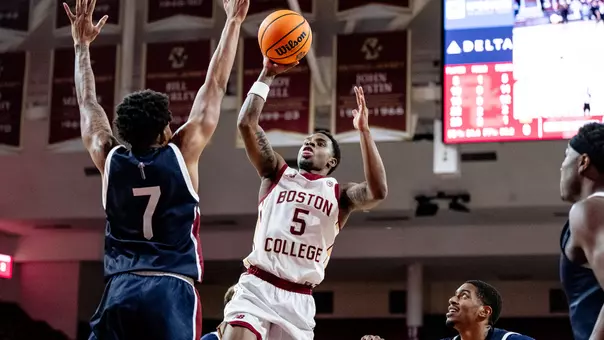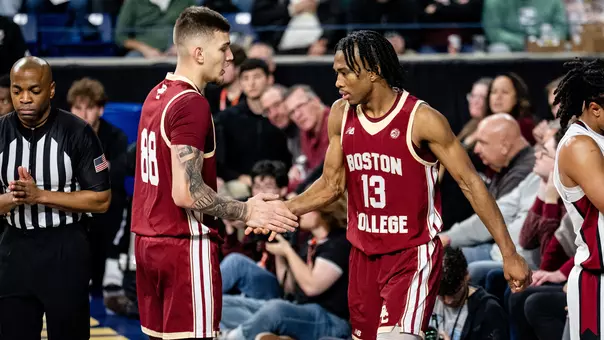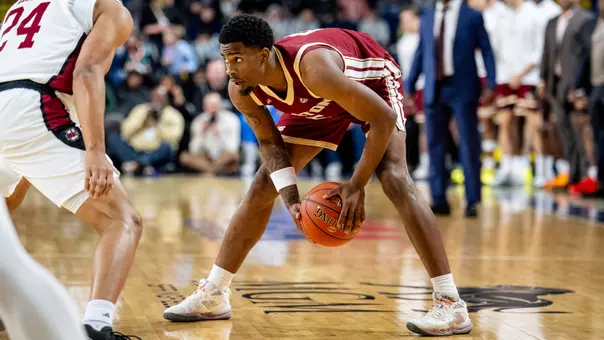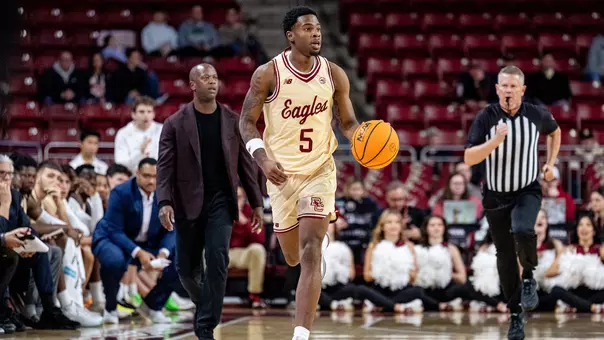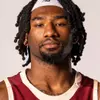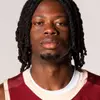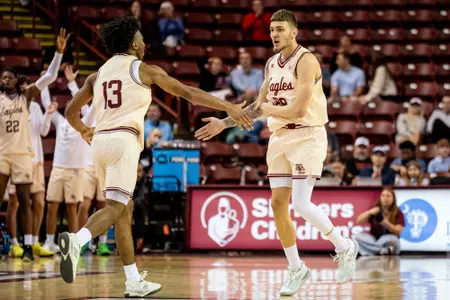
Photo by: Joe Sullivan
The Opening Tip: Harvard
November 25, 2025 | Men's Basketball, #ForBoston Files
Wake up the echoes from Bob Cousy and Satch Sanders.
Lost to the annals of the rich Massachusetts college basketball tradition sits a Beanpot award that's rarely ever mentioned. Its limited history is restricted to Boston-area teams that once produced an incredible intracity rivalry in days preceding conference affiliations, but no banners or trophies reside in their vast collection of encased treasures. No dusty closet of newspaper clippings are part of the anthology from the 1960s or 1970s, and the writers who once covered the games are more associated with their legendary statuses at the national level.
None of that seemed to matter when Boston College and Harvard met on the Boston Garden hardwoods as part of December 8, 1970's Beanpot championship game. It sits nestled into the history books of both the Eagles and Crimson as a 73-71 win, but the importance of its victory required a pound sign in the year-by-year instruction of BC's vast basketball past.
"[Jim O'Brien's] steal with 1:02 remaining and his ensuing twisting fadeaway shot from the corner with eight seconds left gave Boston College a you-had-to-be-there-to-believe-it 73-71 victory over Harvard for the Beanpot championship," wrote Peter Gammons - the same Peter Gammons that later revolutionized baseball media. "Only 2,539 people showed up, but those other 13,000 empty seats saw one fantastic show."
BC beating Harvard was commonplace in that era, but the Crimson resembled nothing of the national relevance attained through their 21st century Ivy League championships. The conference readily ran through either Penn or Princeton for every title banner between 1959 and the late 2000s with two notable exceptions in the 1980s, but Brown's title in 1986 and Cornell's crown in 1988 were the only two seasons in which either the Quakers or Tigers didn't tie somebody atop a league devoid of a postseason tournament.
The Crimson failed to finish higher than fourth during the first 15 years of Ivy play, and their lone second place finish was a runner-up spot in 1984 that they failed to replicate over succeeding years. Championships were out of the question, especially when teams like Princeton scored perfect records and upset-related relevance in the national tournament, so the city championship in Boston ultimately prevailed upon them to make good on their quest for a title.
That naturally juxtaposed against the basketball-based explosion at Boston College. The Eagles modestly advanced to eight national tournaments between 1958 and 1992, but their shared history with Providence, Villanova, Holy Cross and the remainder of the Catholic school circuit of the Northeast led them onto a logical collision course with clearly defined power that it drew from Bob Cousy's time behind the bench.
Harvard's chance at beating Boston College in 1970 therefore required creative gameplay against Chuck Daly's young and ambitious ability to shut down opponents. A program that he inherited from Bob Cousy more naturally started to form into his style of play, and the chance to beat the Crimson in the Beanpot's 1970 edition gave him victorious tastebuds on the Garden parquet.
"It's the biggest win I've had as a college coach," admitted Daly in his postgame remarks. "You can't say enough about our forwards, particularly Frank Fitzgerald, Peter Schmid and David Freitag coming off the bench."
The Beanpot ended after the 1976 season, but the short tenure helped entrench BC as a preeminent powerhouse for the Commonwealth. A state that drew its power from Boston crowned a champion within its city limits, but the battle lines between the four traditional schools couldn't survive the changing tides within an ever-growing basketball game. The Big East loomed and lurked while BU and Northeastern fomented America East's foundation, and Harvard eventually found its footing in the mid-2000s.
Even without the Beanpot trophy, other, more richly-developed storylines still take a backseat whenever Boston teams draw one another on their respective schedules, and even the most even-keeled BC fan harbors the bitter and foul aftertaste of Harvard's ascension under head coach Tommy Amaker. A holiday steeped in gratitude is on the horizon, and no trophy is on the line.
Just don't tell that to the memories of Bob Cousy or Chuck Daly or Jim O'Brien or Bob Zuffaletto or John Austin, and don't tell that to Floyd Wilson, Robert Harrison, Satch Sanders or Tommy Amaker.
Here's what's on tap when Harvard comes to Conte:
****
Harvard Storylines (Reggie Miller Edition)
If you want to be a hero, you have to take hero shots.
I asked my wife for a "classic quotable basketball player" for this game's edition, so all blame for choosing Miller belongs to her apt and deserving basketball mind. I readily admit that my household is a hoops haven for weeknight and weekend viewing, but even she forgot how much I despised the Indiana Pacers during the 1990s. I constantly review YouTube video from Larry Bird's 1991 performance against the team, and that entire team - Miller, Chuck Person, Rik Smits, Detlef Schrempf - made it onto my basketball hate list before Bird eventually led Miller and Smits to an NBA Finals (or before Schrempf paired with Shawn Kemp to form a devastating duo in NBA Jam).
I hated the perceived arrogance that eventually became Miller's hallmark and cocky confidence against any opponent. His reputation as a one-dimensional shooter ultimately unraveled as he got older because his unabashed deepening of a three-point role made teammates better at the interior or more open shots, and his interview in The Last Dance made it clear that he didn't fear Michael Jordan or the mighty Chicago Bulls.
Drawing the parallel, it's easy to look at Boston College and assume certain holes or gaps about the team's overall game after the 93-90 overtime loss to Tulane. The Eagles lost a six-point lead in the second half before needing to tie the game on two separate occasions in the final minute, which by itself forms a valid criticism about their ability to close out an opponent. Losing to Tulane in overtime occurred on the same metaphysical plane as the Florida Atlantic game, so losing twice to teams from The American now form a couple of unwanted pillars.
Differences, though, exist in the games. BC still has to learn how to close out opponents, but Fred Payne's emergence as a legitimate late game threat is adding dynamism to a lineup that needed a secondary alpha. His three-pointer with eight seconds remaining required more setup and less desperation than Boden Kapke's feel-based three with three seconds left and therefore added to his total resume.
"He's developing before our eyes every day," said head coach Earl Grant. "It's unfortunate that we have to deal with adversity [because] adversity isn't always the worst thing, but it's certainly not comfortable. We see guys developing every day, and they're improving and doing good things. With Fred, he's growing and getting better. He made that huge shot, so we still have to push forward to try and learn from this adversity to get ready for the next one."
Whether it's the best player or the 12th man next to the Gatorade cooler, understanding the personalities on your team is key.
Payne's 15 points on 4-for-14 shooting certainly wasn't the perfect night for BC, but his production and his ability to get to the line occurred within the framework of an overall team game that's starting to grow individual performances. Donald Hand, Jr., for example, shot 8-for-19 from the floor but largely abandoned the three-pointer in the first half after missing his first three attempts. Revisiting it in the second half was a different outcome because the Chase Forte's performance stretched the Green Wave defense to look at second and third shooters, which is exactly what nearly happened in the final seconds of the overtime period loss.
"We have to look for the best shot," said Grant. "When Chase came off the screen [near the end of overtime], they double-teamed him. The first option was to attack the basket, so he did a great thing by moving the ball. The second option was if he could get downhill, so we had Aidan Shaw run to the rim on the backside, but he couldn't get downhill. So the next option was Boden Kapke. [Forte] made the right read, and Boden took a shot. He had just made a huge one [at the end of regulation], and if he made it, we would have won the game. He could have swung it to Fred, so we had multiple options, but I didn't really question his shot in that situation in the game."
Isolation basketball at the end of a game is much more prevalent in an NBA game where superstars rule the court. Setting a single shooter against a single defender is how most teams dramatically swing the ball to players like Anthony Edwards or Shai Gilgeous-Alexander, and the James Harden effect intentionally seeks isolated situations to capitalize on individualized talent within the dribble, the step back, the separation crossover, or any other move that winds up in someone's playbook.
College coaches trend differently by operating through options. BC in particular didn't have a true second or third option until Payne, Forte, Kapke and others started taking and making late game baskets, so the player that has the ball is often the result of a reaction elsewhere on the court. Moving Shaw to the basket, for example, tried to launch Forte into a downhill dribble after Tulane decided to double-team the ball in overtime, but when the defense didn't bite, the options were either a contested bad look or a better look for the open shooter. Given that Kapke hit the exact same three at the end of regulation, it's the right call to process information in real time.
The only problem: BC hadn't really built that database for the Tulane game. As the season moves forward, redeveloping that scenario needs to improve its outcome.
Defenses had to play us, obviously, out to the arc, but it was really my mid-range game that was probably more dangerous than my three-point shot.
Harvard derives the majority of its success from a more balanced basketball game that whittles an opponent for a full 40 minutes. The Crimson are 4-3 but started the year with four wins in their first five games because they played with brutal efficiency against teams like New Hampshire, Army and Marist. They outplayed Northeastern for a long stretch at both the start and end of their game at home against the Huskies but fell out of sync with three-point shooting outside of Tey Barbour's 4-for-8 game, but regaining a stroke nearly toppled Penn State and Boston University.
Because I'm a firm believer that one-point losses don't originate on the final possession, I gave the 75-74 loss to BU a bit more of a fine-toothed comb and discovered how Harvard spreads the ball around to different players. Robert Hinton, for example, went 13-for-17 for 34 points against the Terriers, but Barbour and Thomas Batties each scored 15 and 14, respectively, by hitting the right number of two-point and three-point shots. That differed from the four-point loss to Penn State where Chandler Pigge scored 21 points on 8-of-11 from the floor and Batties and Ben Eisendrath scored 17 and 15, respectively. Hinton, for what it's worth, only had two points in that one.
The offenses clicked in both of those games to an extreme degree, but the Marist game, which was a win, saw Harvard's main players suffer through inconsistent production. Pigge led all scorers with 14 points while Hinton and Barbour scored 13 points and 10 points, respectively, but they each needed free throws to get there.
Nobody scored 20 points, so the more direct path to beating Harvard requires the BC defense to hold a shooter under a magic number. Complementary pieces can get their numbers, but containing whichever player attempts to break away from the peloton can force the Crimson into a bad day offensively.
*****
Question Box
How important is switching against the Harvard offense?
Pigge's numbers make him the most important railroad spike in Harvard's transition game. He's a decent enough rebounder at six-feet, five-inches, and playing 84 percent of the team's overall minutes keeps him next to Hinton, Barbour and Batties for most time on the floor. Nearly a quarter of Harvard's possessions run through his hands, just as a separate quarter run through Hinton and Xavier Nesbitt.
Stopping Harvard therefore requires the defense to understand exactly how to switch assignments. Communication is a massive requirement against this team because nobody is running an isolation shot. Running the ball through the power forward position also requires switching to avoid crashing too hard on the interior because the guards very clearly understand how to shoot the three.
Can BC avoid sending Harvard to the charity stripe?
Both BC and Tulane attempted 36 free throws on Sunday afternoon, so removing one or two calls dramatically shifts the dynamic of a game decided by three points in overtime. Even aside from removing points from the scoreboard, foul trouble forced Jayden Hastings to the bench with six first half minutes while limiting Luka Toews to three minutes. Boden Kapke took two fouls early in the first half and played 10 minutes before landing a third foul that limited him to a grand total of 20 minutes across the two halves and overtime.
Harvard is one of the best teams in the country at avoiding that situation but haven't been as successful at earning free throws as a collective group. Getting BC in foul trouble might help that situation because the thin line between Harvard and BC draws a path to getting the Crimson more attempts at the stripe.
How much traffic is heading into Boston on Wednesday?
Thanksgiving week is one of the most heavily trafficked times of year on Boston roadways. It's especially thick along the Southeast Expressway, I-95, I-84 out through Connecticut, and the connecting Mass Pike that leads from Boston to points west and southwest. In other words, unless you're staying at home or going up the random state highway through the Vermont border, you're likely running into some afternoon traffic.
Leaving anywhere from 30 to 60 minutes is a bit of a hassle, but saving time on the back end is critical. My recommendation is naturally to plan a day in town that requires little to no driving, and either head to BC via the green line or early enough to walk around and get some food. Plenty of places are around campus, especially if you're adventurous and have the stamina for a good walk through Brookline. Make a day of it while your husband or wife goes bananas in the kitchen, and be the hero that gets the kids out of the house on the day before Thanksgiving.
*****
BC-Harvard X Factor
The game isn't over until the clock hits zero. -Paul Pierce
BC and Harvard are two of the most patient offensive teams in the country. Each averages around 17 to 19 seconds per possession against a national average that just crept over 17 seconds, and each runs a tempo that's within the bottom-75 Division I teams. Neither one attempts to clobber an opponent with inefficient field goals, and they each spread the majority of their minutes around defenses that milk an opponent's offense even closer to the end of a shot clock.
Leads are therefore at a premium while simultaneously looking very surmountable. Everything in this game is about whittling a team's patience into a nub until it makes an emotional or mental mistake, and if that's the case, BC holds the decided advantage as one of the teams with the best non-turnover steal percentages in the nation.
"One of the reasons that the points in the paint [by Tulane] was so high was because we allowed them to attack the basket or get around us late [in the shot clock]," said Grant. "I thought when we went with Shaw at the [center], it actually helped us, even though we didn't want Boden and Jayden to have that many fouls that early, but I thought Shaw really helped us when he went to the five, and we went small."
*****
Scoreboard Watching
The Feast Week tournament season swung into yet another gear this week when the Maui Invitational and Players Era Festival got underway in Hawaii and Las Vegas. Each received ample criticism for sending serious non-conference matchups to neutral sites while they could have held the majority of the games on the larger campus site arenas, but each still gave us a number of incredible games that were worth watching.
On Monday, for example, No. 15 Iowa State remained undefeated by beating No. 14 St. John's, 83-82, after Joshua Jefferson iced the game with a couple of last second free throws, and No. 12 Gonzaga handed No. 8 Alabama a 10-point loss behind Tyon Grant-Foster and Graham Ike's 21 points apiece. In the ACC, Syracuse rode No. 3 Houston to the limit of a 78-74 loss at the Players Era Festival before the Cougars lost to No.17 Tennessee, 76-73, on Tuesday, and No. 23 NC State dropped an 11-point loss to unbeaten Seton Hall before beating Boise State in the Maui tournament
On Wednesday, meanwhile, the BC-Harvard game lands right in the middle of another full basketball day that begins at noon with No. 24 Vanderbilt's game against Western Kentucky in the Battle 4 Atlantis. One hour later, No. 20 Texas Tech tips off against New Orleans in a standard non-conference game while the night ends with No. 19 Kentucky playing Tennessee Tech at Rupp Arena ahead of No. 6 Louisville's game against NJIT and No. 23 NC State's Fifth Place Game in Maui.
Those two games round out the ACC slate aside from undefeated Virginia Tech's game against 4-1 Colorado State at the Battle 4 Atlantis.
More locally, UMass-Lowell is at Stonehill at noon while Holy Cross plays Division III Worcester State at 2 p.m. BC's next opponent, LSU, is off until Friday's Emerald Coast Classic game against Drake.
*****
This Random Day In History
The current City Hall Plaza in Boston is located directly above the MBTA stop that runs underneath Government Center's blue line and green line interchanges. The land once known as Scollay Square is also home to Boston City Hall and the Edward Brooke Courthouse and resembles nothing of the scene once outlined in the infamous Kingston Trio song about poor Charlie and his never ending quest to get off of the MTA.
The old Brattle Street connected the area to Faneuil Hall before its demolition in the 1960s. John Adams lived there before moving to Braintree, and Captain Arthur Savage lived there while serving as Boston's constable and magistrate.
Now I'm sure that Arthur Savage was good at his job in the early 1700s and all, but that's not why I'm mentioning him. For some weird reason that's still unclear to me, he opted to display a tamed male lion at his house on November 26, 1716. He was a congregant at the Old North Church and a noted sea captain, but he made a public spectacle out of selling admission to people who wanted to see the lion at his home on Brattle Street.
Yep, a lion. Living right there at what's the present-day City Hall Plaza.
Insert your own joke about it causing a traffic meltdown in Boston.
*****
Pregame Quote and Final Thoughts
It doesn't matter how you get knocked down in life because that's going to happen. All that matters is that you have to get back up. -Ben Affleck
The Beanpot hasn't been awarded for 50 years. Harvard and Boston College aren't drawing their teams from local roots, and they don't run in the same circles of college basketball's greater society. Each plays for something greater within their own conference.
Come Wednesday night, none of that matters. Boston and Harvard on a gymnasium floor in Chestnut Hill is enough to rattle the senses for a great night at Conte Forum.
Boston College and Harvard tip-off at 4 p.m. on Friday afternoon from Conte Forum in Chestnut Hill, Massachusetts. The game can be seen as part of the ACC Network Extra's streaming platform that's available through ESPN's direct-to-consumer platform on Internet and mobile device apps. Radio coverage is additionally available through WEEI 850 AM.
None of that seemed to matter when Boston College and Harvard met on the Boston Garden hardwoods as part of December 8, 1970's Beanpot championship game. It sits nestled into the history books of both the Eagles and Crimson as a 73-71 win, but the importance of its victory required a pound sign in the year-by-year instruction of BC's vast basketball past.
"[Jim O'Brien's] steal with 1:02 remaining and his ensuing twisting fadeaway shot from the corner with eight seconds left gave Boston College a you-had-to-be-there-to-believe-it 73-71 victory over Harvard for the Beanpot championship," wrote Peter Gammons - the same Peter Gammons that later revolutionized baseball media. "Only 2,539 people showed up, but those other 13,000 empty seats saw one fantastic show."
BC beating Harvard was commonplace in that era, but the Crimson resembled nothing of the national relevance attained through their 21st century Ivy League championships. The conference readily ran through either Penn or Princeton for every title banner between 1959 and the late 2000s with two notable exceptions in the 1980s, but Brown's title in 1986 and Cornell's crown in 1988 were the only two seasons in which either the Quakers or Tigers didn't tie somebody atop a league devoid of a postseason tournament.
The Crimson failed to finish higher than fourth during the first 15 years of Ivy play, and their lone second place finish was a runner-up spot in 1984 that they failed to replicate over succeeding years. Championships were out of the question, especially when teams like Princeton scored perfect records and upset-related relevance in the national tournament, so the city championship in Boston ultimately prevailed upon them to make good on their quest for a title.
That naturally juxtaposed against the basketball-based explosion at Boston College. The Eagles modestly advanced to eight national tournaments between 1958 and 1992, but their shared history with Providence, Villanova, Holy Cross and the remainder of the Catholic school circuit of the Northeast led them onto a logical collision course with clearly defined power that it drew from Bob Cousy's time behind the bench.
Harvard's chance at beating Boston College in 1970 therefore required creative gameplay against Chuck Daly's young and ambitious ability to shut down opponents. A program that he inherited from Bob Cousy more naturally started to form into his style of play, and the chance to beat the Crimson in the Beanpot's 1970 edition gave him victorious tastebuds on the Garden parquet.
"It's the biggest win I've had as a college coach," admitted Daly in his postgame remarks. "You can't say enough about our forwards, particularly Frank Fitzgerald, Peter Schmid and David Freitag coming off the bench."
The Beanpot ended after the 1976 season, but the short tenure helped entrench BC as a preeminent powerhouse for the Commonwealth. A state that drew its power from Boston crowned a champion within its city limits, but the battle lines between the four traditional schools couldn't survive the changing tides within an ever-growing basketball game. The Big East loomed and lurked while BU and Northeastern fomented America East's foundation, and Harvard eventually found its footing in the mid-2000s.
Even without the Beanpot trophy, other, more richly-developed storylines still take a backseat whenever Boston teams draw one another on their respective schedules, and even the most even-keeled BC fan harbors the bitter and foul aftertaste of Harvard's ascension under head coach Tommy Amaker. A holiday steeped in gratitude is on the horizon, and no trophy is on the line.
Just don't tell that to the memories of Bob Cousy or Chuck Daly or Jim O'Brien or Bob Zuffaletto or John Austin, and don't tell that to Floyd Wilson, Robert Harrison, Satch Sanders or Tommy Amaker.
Here's what's on tap when Harvard comes to Conte:
****
Harvard Storylines (Reggie Miller Edition)
If you want to be a hero, you have to take hero shots.
I asked my wife for a "classic quotable basketball player" for this game's edition, so all blame for choosing Miller belongs to her apt and deserving basketball mind. I readily admit that my household is a hoops haven for weeknight and weekend viewing, but even she forgot how much I despised the Indiana Pacers during the 1990s. I constantly review YouTube video from Larry Bird's 1991 performance against the team, and that entire team - Miller, Chuck Person, Rik Smits, Detlef Schrempf - made it onto my basketball hate list before Bird eventually led Miller and Smits to an NBA Finals (or before Schrempf paired with Shawn Kemp to form a devastating duo in NBA Jam).
I hated the perceived arrogance that eventually became Miller's hallmark and cocky confidence against any opponent. His reputation as a one-dimensional shooter ultimately unraveled as he got older because his unabashed deepening of a three-point role made teammates better at the interior or more open shots, and his interview in The Last Dance made it clear that he didn't fear Michael Jordan or the mighty Chicago Bulls.
Drawing the parallel, it's easy to look at Boston College and assume certain holes or gaps about the team's overall game after the 93-90 overtime loss to Tulane. The Eagles lost a six-point lead in the second half before needing to tie the game on two separate occasions in the final minute, which by itself forms a valid criticism about their ability to close out an opponent. Losing to Tulane in overtime occurred on the same metaphysical plane as the Florida Atlantic game, so losing twice to teams from The American now form a couple of unwanted pillars.
Differences, though, exist in the games. BC still has to learn how to close out opponents, but Fred Payne's emergence as a legitimate late game threat is adding dynamism to a lineup that needed a secondary alpha. His three-pointer with eight seconds remaining required more setup and less desperation than Boden Kapke's feel-based three with three seconds left and therefore added to his total resume.
"He's developing before our eyes every day," said head coach Earl Grant. "It's unfortunate that we have to deal with adversity [because] adversity isn't always the worst thing, but it's certainly not comfortable. We see guys developing every day, and they're improving and doing good things. With Fred, he's growing and getting better. He made that huge shot, so we still have to push forward to try and learn from this adversity to get ready for the next one."
Whether it's the best player or the 12th man next to the Gatorade cooler, understanding the personalities on your team is key.
Payne's 15 points on 4-for-14 shooting certainly wasn't the perfect night for BC, but his production and his ability to get to the line occurred within the framework of an overall team game that's starting to grow individual performances. Donald Hand, Jr., for example, shot 8-for-19 from the floor but largely abandoned the three-pointer in the first half after missing his first three attempts. Revisiting it in the second half was a different outcome because the Chase Forte's performance stretched the Green Wave defense to look at second and third shooters, which is exactly what nearly happened in the final seconds of the overtime period loss.
"We have to look for the best shot," said Grant. "When Chase came off the screen [near the end of overtime], they double-teamed him. The first option was to attack the basket, so he did a great thing by moving the ball. The second option was if he could get downhill, so we had Aidan Shaw run to the rim on the backside, but he couldn't get downhill. So the next option was Boden Kapke. [Forte] made the right read, and Boden took a shot. He had just made a huge one [at the end of regulation], and if he made it, we would have won the game. He could have swung it to Fred, so we had multiple options, but I didn't really question his shot in that situation in the game."
Isolation basketball at the end of a game is much more prevalent in an NBA game where superstars rule the court. Setting a single shooter against a single defender is how most teams dramatically swing the ball to players like Anthony Edwards or Shai Gilgeous-Alexander, and the James Harden effect intentionally seeks isolated situations to capitalize on individualized talent within the dribble, the step back, the separation crossover, or any other move that winds up in someone's playbook.
College coaches trend differently by operating through options. BC in particular didn't have a true second or third option until Payne, Forte, Kapke and others started taking and making late game baskets, so the player that has the ball is often the result of a reaction elsewhere on the court. Moving Shaw to the basket, for example, tried to launch Forte into a downhill dribble after Tulane decided to double-team the ball in overtime, but when the defense didn't bite, the options were either a contested bad look or a better look for the open shooter. Given that Kapke hit the exact same three at the end of regulation, it's the right call to process information in real time.
The only problem: BC hadn't really built that database for the Tulane game. As the season moves forward, redeveloping that scenario needs to improve its outcome.
Defenses had to play us, obviously, out to the arc, but it was really my mid-range game that was probably more dangerous than my three-point shot.
Harvard derives the majority of its success from a more balanced basketball game that whittles an opponent for a full 40 minutes. The Crimson are 4-3 but started the year with four wins in their first five games because they played with brutal efficiency against teams like New Hampshire, Army and Marist. They outplayed Northeastern for a long stretch at both the start and end of their game at home against the Huskies but fell out of sync with three-point shooting outside of Tey Barbour's 4-for-8 game, but regaining a stroke nearly toppled Penn State and Boston University.
Because I'm a firm believer that one-point losses don't originate on the final possession, I gave the 75-74 loss to BU a bit more of a fine-toothed comb and discovered how Harvard spreads the ball around to different players. Robert Hinton, for example, went 13-for-17 for 34 points against the Terriers, but Barbour and Thomas Batties each scored 15 and 14, respectively, by hitting the right number of two-point and three-point shots. That differed from the four-point loss to Penn State where Chandler Pigge scored 21 points on 8-of-11 from the floor and Batties and Ben Eisendrath scored 17 and 15, respectively. Hinton, for what it's worth, only had two points in that one.
The offenses clicked in both of those games to an extreme degree, but the Marist game, which was a win, saw Harvard's main players suffer through inconsistent production. Pigge led all scorers with 14 points while Hinton and Barbour scored 13 points and 10 points, respectively, but they each needed free throws to get there.
Nobody scored 20 points, so the more direct path to beating Harvard requires the BC defense to hold a shooter under a magic number. Complementary pieces can get their numbers, but containing whichever player attempts to break away from the peloton can force the Crimson into a bad day offensively.
*****
Question Box
How important is switching against the Harvard offense?
Pigge's numbers make him the most important railroad spike in Harvard's transition game. He's a decent enough rebounder at six-feet, five-inches, and playing 84 percent of the team's overall minutes keeps him next to Hinton, Barbour and Batties for most time on the floor. Nearly a quarter of Harvard's possessions run through his hands, just as a separate quarter run through Hinton and Xavier Nesbitt.
Stopping Harvard therefore requires the defense to understand exactly how to switch assignments. Communication is a massive requirement against this team because nobody is running an isolation shot. Running the ball through the power forward position also requires switching to avoid crashing too hard on the interior because the guards very clearly understand how to shoot the three.
Can BC avoid sending Harvard to the charity stripe?
Both BC and Tulane attempted 36 free throws on Sunday afternoon, so removing one or two calls dramatically shifts the dynamic of a game decided by three points in overtime. Even aside from removing points from the scoreboard, foul trouble forced Jayden Hastings to the bench with six first half minutes while limiting Luka Toews to three minutes. Boden Kapke took two fouls early in the first half and played 10 minutes before landing a third foul that limited him to a grand total of 20 minutes across the two halves and overtime.
Harvard is one of the best teams in the country at avoiding that situation but haven't been as successful at earning free throws as a collective group. Getting BC in foul trouble might help that situation because the thin line between Harvard and BC draws a path to getting the Crimson more attempts at the stripe.
How much traffic is heading into Boston on Wednesday?
Thanksgiving week is one of the most heavily trafficked times of year on Boston roadways. It's especially thick along the Southeast Expressway, I-95, I-84 out through Connecticut, and the connecting Mass Pike that leads from Boston to points west and southwest. In other words, unless you're staying at home or going up the random state highway through the Vermont border, you're likely running into some afternoon traffic.
Leaving anywhere from 30 to 60 minutes is a bit of a hassle, but saving time on the back end is critical. My recommendation is naturally to plan a day in town that requires little to no driving, and either head to BC via the green line or early enough to walk around and get some food. Plenty of places are around campus, especially if you're adventurous and have the stamina for a good walk through Brookline. Make a day of it while your husband or wife goes bananas in the kitchen, and be the hero that gets the kids out of the house on the day before Thanksgiving.
*****
BC-Harvard X Factor
The game isn't over until the clock hits zero. -Paul Pierce
BC and Harvard are two of the most patient offensive teams in the country. Each averages around 17 to 19 seconds per possession against a national average that just crept over 17 seconds, and each runs a tempo that's within the bottom-75 Division I teams. Neither one attempts to clobber an opponent with inefficient field goals, and they each spread the majority of their minutes around defenses that milk an opponent's offense even closer to the end of a shot clock.
Leads are therefore at a premium while simultaneously looking very surmountable. Everything in this game is about whittling a team's patience into a nub until it makes an emotional or mental mistake, and if that's the case, BC holds the decided advantage as one of the teams with the best non-turnover steal percentages in the nation.
"One of the reasons that the points in the paint [by Tulane] was so high was because we allowed them to attack the basket or get around us late [in the shot clock]," said Grant. "I thought when we went with Shaw at the [center], it actually helped us, even though we didn't want Boden and Jayden to have that many fouls that early, but I thought Shaw really helped us when he went to the five, and we went small."
*****
Scoreboard Watching
The Feast Week tournament season swung into yet another gear this week when the Maui Invitational and Players Era Festival got underway in Hawaii and Las Vegas. Each received ample criticism for sending serious non-conference matchups to neutral sites while they could have held the majority of the games on the larger campus site arenas, but each still gave us a number of incredible games that were worth watching.
On Monday, for example, No. 15 Iowa State remained undefeated by beating No. 14 St. John's, 83-82, after Joshua Jefferson iced the game with a couple of last second free throws, and No. 12 Gonzaga handed No. 8 Alabama a 10-point loss behind Tyon Grant-Foster and Graham Ike's 21 points apiece. In the ACC, Syracuse rode No. 3 Houston to the limit of a 78-74 loss at the Players Era Festival before the Cougars lost to No.17 Tennessee, 76-73, on Tuesday, and No. 23 NC State dropped an 11-point loss to unbeaten Seton Hall before beating Boise State in the Maui tournament
On Wednesday, meanwhile, the BC-Harvard game lands right in the middle of another full basketball day that begins at noon with No. 24 Vanderbilt's game against Western Kentucky in the Battle 4 Atlantis. One hour later, No. 20 Texas Tech tips off against New Orleans in a standard non-conference game while the night ends with No. 19 Kentucky playing Tennessee Tech at Rupp Arena ahead of No. 6 Louisville's game against NJIT and No. 23 NC State's Fifth Place Game in Maui.
Those two games round out the ACC slate aside from undefeated Virginia Tech's game against 4-1 Colorado State at the Battle 4 Atlantis.
More locally, UMass-Lowell is at Stonehill at noon while Holy Cross plays Division III Worcester State at 2 p.m. BC's next opponent, LSU, is off until Friday's Emerald Coast Classic game against Drake.
*****
This Random Day In History
The current City Hall Plaza in Boston is located directly above the MBTA stop that runs underneath Government Center's blue line and green line interchanges. The land once known as Scollay Square is also home to Boston City Hall and the Edward Brooke Courthouse and resembles nothing of the scene once outlined in the infamous Kingston Trio song about poor Charlie and his never ending quest to get off of the MTA.
The old Brattle Street connected the area to Faneuil Hall before its demolition in the 1960s. John Adams lived there before moving to Braintree, and Captain Arthur Savage lived there while serving as Boston's constable and magistrate.
Now I'm sure that Arthur Savage was good at his job in the early 1700s and all, but that's not why I'm mentioning him. For some weird reason that's still unclear to me, he opted to display a tamed male lion at his house on November 26, 1716. He was a congregant at the Old North Church and a noted sea captain, but he made a public spectacle out of selling admission to people who wanted to see the lion at his home on Brattle Street.
Yep, a lion. Living right there at what's the present-day City Hall Plaza.
Insert your own joke about it causing a traffic meltdown in Boston.
*****
Pregame Quote and Final Thoughts
It doesn't matter how you get knocked down in life because that's going to happen. All that matters is that you have to get back up. -Ben Affleck
The Beanpot hasn't been awarded for 50 years. Harvard and Boston College aren't drawing their teams from local roots, and they don't run in the same circles of college basketball's greater society. Each plays for something greater within their own conference.
Come Wednesday night, none of that matters. Boston and Harvard on a gymnasium floor in Chestnut Hill is enough to rattle the senses for a great night at Conte Forum.
Boston College and Harvard tip-off at 4 p.m. on Friday afternoon from Conte Forum in Chestnut Hill, Massachusetts. The game can be seen as part of the ACC Network Extra's streaming platform that's available through ESPN's direct-to-consumer platform on Internet and mobile device apps. Radio coverage is additionally available through WEEI 850 AM.
Players Mentioned
BC Men's Hockey All-Access
Saturday, December 27
Men's Basketball: FDU Postgame Press Conference (Dec. 22, 2025)
Tuesday, December 23
Men's Basketball: UMass Postgame Press Conference (Dec. 10, 2025)
Thursday, December 11
Women's Basketball: Bryant Postgame Press Conference (Dec. 9, 2025)
Wednesday, December 10

